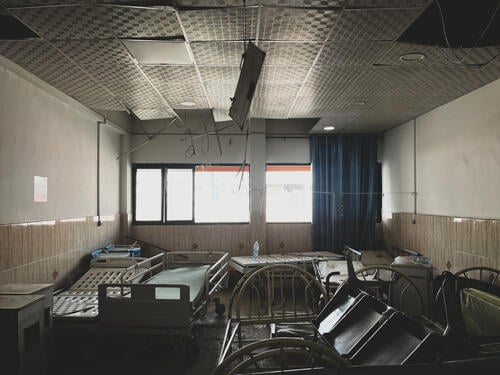Médecins Sans Frontières (MSF) teams in the Gaza Strip, Palestine, are facing critical shortages of essential medicines and equipment. Our teams have been unable to bring any medical supplies into Gaza since the end of April. The closure of the Rafah border crossing, following Israel’s offensive in the south of Gaza in early May, coupled with the endless red tape imposed by Israeli authorities, have dramatically congested the flow of humanitarian aid through the Kerem Shalom entry point.
This has led to massive queues of trucks and perilous delays in the delivery of humanitarian assistance across Gaza. Even when aid can finally enter the Strip, insecurity often does not allow humanitarian organisations to get it where it is desperately needed.
Despite medical needs skyrocketing across the Strip, without a significant refill of medical supplies in the coming days, MSF might have to stop or drastically reduce some of our medical activities in Gaza.
“Our medical supplies are critically low due to the limited flow of aid that is being allowed into Gaza by the Israeli authorities,” Guillemette Thomas, MSF medical coordinator in Palestine. “If we don’t manage to get medical supplies into Gaza very soon, we may have to stop our medical activities. This is an unthinkable reality given the desperate medical needs of thousands of people in Gaza.”
“We have patients with severe burns, open fractures, and we don’t even have enough painkillers to alleviate their suffering,” says Thomas. “In Nasser and Al-Aqsa hospitals, our teams have had to reduce the frequency of dressing changes for patients with severe burns due to the lack of sterile compress gauzes, without which could lead to more infected wounds.”

With 75 per cent of Gazans displaced and forced to live in appalling conditions, MSF teams have seen a surge of patients with skin diseases, such as scabies, over the past month, while our stocks of drugs to treat them are running dangerously low. In Khan Younis, we were unable to provide general medical consultations for several days in our recently opened Al-Attar healthcare centre, due to the lack of supplies and medications to run activities.
Meanwhile, MSF has six trucks, filled with 37 tons of supplies, the vast majority of which are essential medical items, that have been waiting since 14 June on the Egyptian side of the Kerem Shalom crossing point – unable to cross into Gaza where they are needed to save lives.
“These trucks are lined up, stuck, with about another 1,200 trucks waiting to enter the Strip,” says Thomas. “This is incomprehensible and unacceptable; it’s like asking a fireman to watch a house filled with people burn down and preventing him from putting out the fire.”
“The Israeli authorities must urgently open more crossing points to decongest Kerem Shalom and massively speed up the amount of aid getting through to Gaza on a daily basis,” says Thomas. “We also call on all parties to ensure safe routes to move humanitarian assistance inside the Strip. This is the only way to avoid more preventable deaths.”






